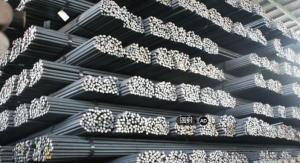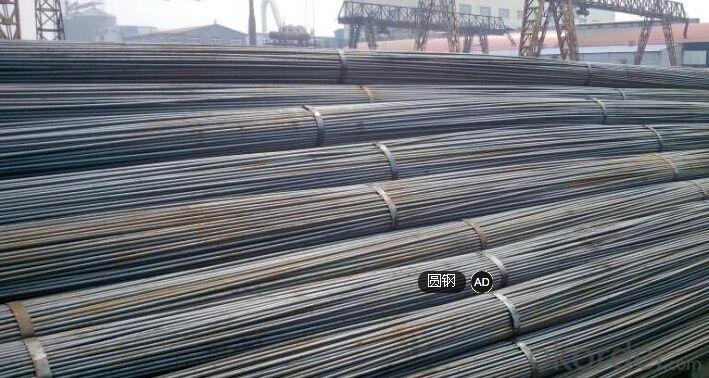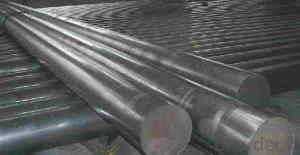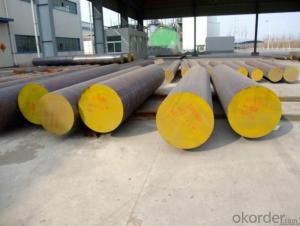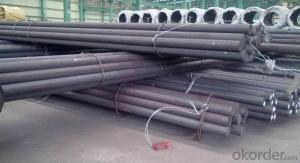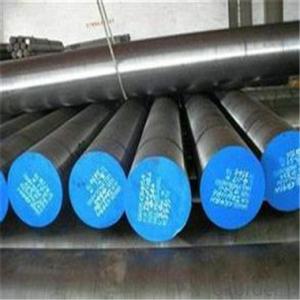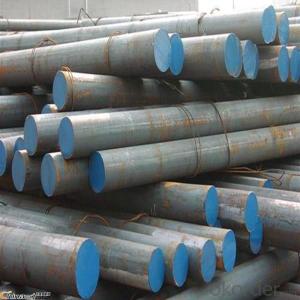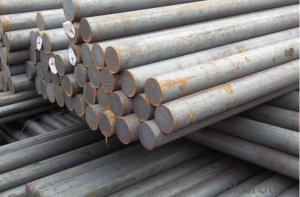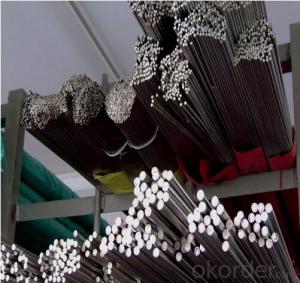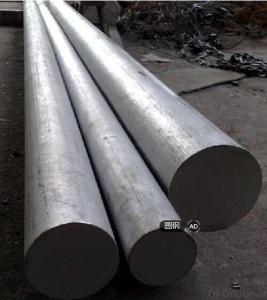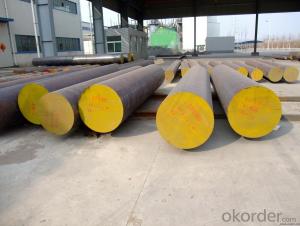Wholesale Round Bar Steel Cr12 Tool Steel 1.2080 Die Steel
- Loading Port:
- Shanghai
- Payment Terms:
- TT OR LC
- Min Order Qty:
- 3 m.t.
- Supply Capability:
- 100000 m.t./month
OKorder Service Pledge
OKorder Financial Service
You Might Also Like
Specification
Wholesale Round Bar Steel Cr12 Tool Steel 1.2080 Die Steel
Details Information of Wholesale Round Bar Steel Cr12 Tool Steel 1.2080 Die Steel
| Name | Round Bar Steel Cr12 Tool Steel 1.2080 Die Steel |
| Shape | Round Bar/Square Bar/Flat Bar/Plate/Wire |
| Standard | GB/ASTM/SAE/AISI/DIN/JIS/EN/BS |
| Surface Treatment: | Black/Peeling/Polished/Machined |
| Delivery Condition: | Hot Rolled or Forged/Peeled or Black Surface |
| Test | SGS/UT 100% Elements Testing |
| Certificate: | ISO/Mill Certificate |
| Service: | 24 hours online service / |
| more than 20 years trading and manufacture | |
| Quality Assurance: | the third party inspection, such as SGS, BV, TUV…etc. is acceptable |
| Packaging Details: | Seaworthy Packaging or as per customer's packing instruction |
| Carbon structure round bar | Q195 Q235A Q235B 10# 20#-55# S45CB |
| Low alloy high strength round bar | Q345A/Q345C/Q345D Q345B Q345E |
| Alloy structure round bar | SAE51B20 20Cr 40Cr 40CrV 20CrMo/30CrMo/35CrMo/42CrMo 20CrMoA/30CrMoA/35CrMoA/42CrMoA/42Cr ML20CrMo/ML30CrMo/ML35CrMo/ML42CrMo B7/SCM435-440 20MnTiB 20CrMnMo 20CrMoH 42CrMoH 40MnB/40MnBH 30Mn2-40Mn2 27SiMn 50CrVA 30CrMnTi |
| Pinion steel | 20CrMnTi 20CrMnTiH 20CrMnTiHCS/20CrMnTiHLD Q20CrMnTi-1/Q20CrMnTi-2 |
| Sucker rod | 20-35CrMoA |
| Free-cutting steel | GT1215S |
| Spring steel | 60Si2MnA 65Mn |
| Ball bearing steel | GCr15 |
Chemical Composition of Wholesale Round Bar Steel Cr12 Tool Steel 1.2080 Die Steel
| C | Si | Mn | P | S | Cr | Ni | Cu |
| 0.17-0.24 | 0.17-0.37 | 0.35-0.65 | ≤0.035 | ≤0.035 | ≤0.25 | ≤0.25 | ≤0.25 |
| Tensile strength (σb/MPa) | Yield strength (σb/MPa) | Elongation (δ5/%) |
| ≥410(42) | ≥245(25) | ≥25 |
Company Introduction of Wholesale Round Bar Steel Cr12 Tool Steel 1.2080 Die Steel
CNBM International Corporation is the most import and export platform of CNBM group(China National Building Material Group Corporation) ,which is a state-owned enterprise, ranked in 270th of Fortune Global 500 in 2015.
With its advantages, CNBM International are mainly concentrate on Cement, Glass, Iron and Steel, Ceramics industries and devotes herself for supplying high quality series of refractories as well as technical consultancies and logistics solution.
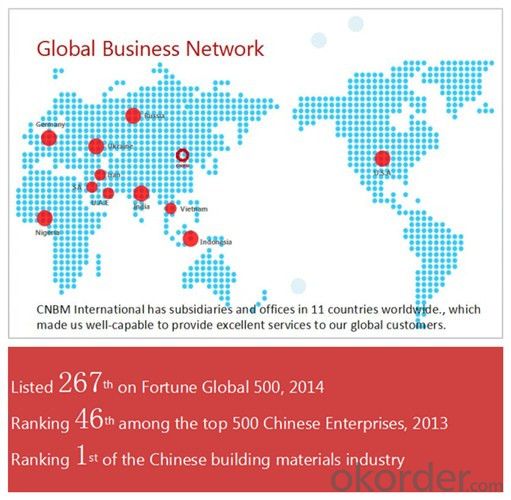
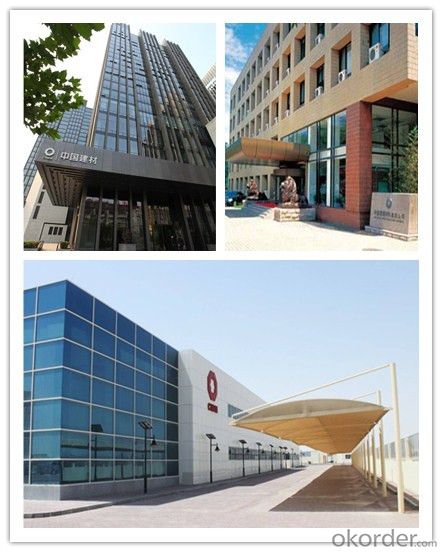
Certificates of Wholesale Round Bar Steel Cr12 Tool Steel 1.2080 Die Steel
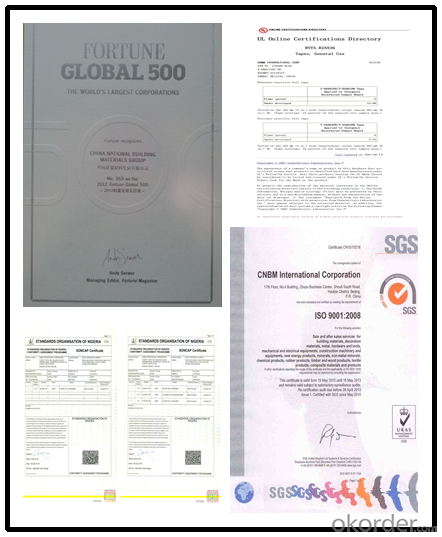
Packaging & Delivery of Wholesale Round Bar Steel Cr12 Tool Steel 1.2080 Die Steel
Packaging Detail | Sea worthy packing /as per customer's packing instruction |
Delivery Detail | 15 ~ 40 days after receiving the deposit |
Products show of Wholesale Round Bar Steel Cr12 Tool Steel 1.2080 Die Steel
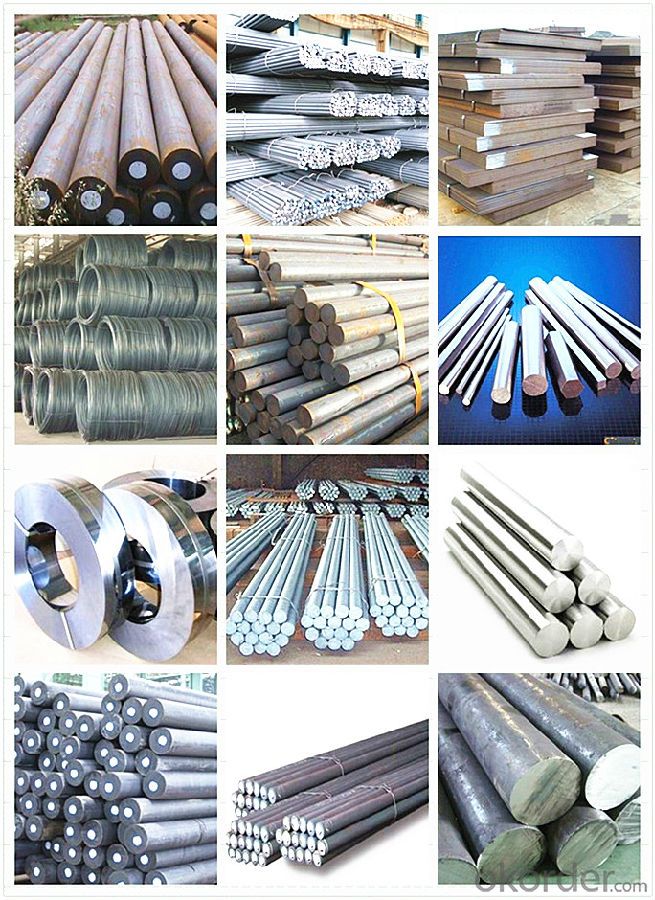
FAQ
Are you a trading company or manufacturer? | Manufacturer |
What’s the MOQ? | 3 metric ton |
What’s your delivery time? | 15-35 days after downpayment received |
Do you Accept OEM service? | Yes |
what’s your delivery terms? | FOB/CFR/CIF |
What's the Payment Terms? | 30% as deposit,70% before shipment by T/T |
Western Union acceptable for small amount. | |
L/C acceptable for large amount. | |
Scrow ,Paybal,Alipay are also ok | |
Why choose us? | Chose happens because of quality, then price, We can give you both. Additionally, we can also offer professional products inquiry, products knowledge train (for agents), smooth goods delivery, excellent customer solution proposals. |
What's your available port of Shipment? | Main Port, China |
What’s your featured services? | Our service formula: good quality+ good price+ good service=customer's trust
|
Where are your Market? | Covering more than 160 countries in the world |
- Q: What are the different case hardening grades of special steel?
- There are several different case hardening grades of special steel, each with its own unique properties and applications. Some of the most commonly used case hardening grades include: 1. 8620: This grade of steel is commonly used for gears, shafts, and other high-stress applications. It has excellent toughness and wear resistance, making it ideal for parts that require both strength and durability. 2. 9310: This grade is often used for aerospace applications due to its high strength and resistance to fatigue. It is commonly used for gears, bearings, and other components that require exceptional toughness and load-carrying capacity. 3. 4340: This grade is known for its high strength and hardenability. It is commonly used for parts that require high tensile strength and good impact resistance, such as crankshafts, connecting rods, and gears. 4. 20MnCr5: This grade is often used in the manufacturing of gears, camshafts, and other components that require high surface hardness and wear resistance. It is known for its excellent case-hardening properties and good core strength. 5. EN36C: Also known as 655M13, this grade is frequently used for making components that require high tensile strength, such as axles, shafts, and crankshafts. It has good hardenability and excellent toughness, making it suitable for heavy-duty applications. It is important to select the appropriate case hardening grade based on the specific application requirements, such as desired hardness, strength, and wear resistance. Consulting with a metallurgist or an expert in materials science can help ensure the right grade is chosen for a particular project.
- Q: Can special steel be used in the construction industry?
- Yes, special steel can be used in the construction industry. It offers several advantages such as high strength, durability, and resistance to corrosion, making it suitable for various applications in construction, including beams, columns, and reinforced concrete structures. Special steel can also provide cost-effective solutions by reducing the need for additional materials and maintenance.
- Q: What are the advantages of using special steel in manufacturing?
- Special steel in manufacturing offers several advantages. Firstly, it provides a higher level of strength and durability compared to regular steel. This is because of the presence of alloying elements, like chromium, nickel, and manganese, which enhance its mechanical properties. As a result, special steel can withstand heavy loads, resist wear and tear, and endure extreme conditions, making it ideal for manufacturing applications requiring strength and longevity. Secondly, special steel exhibits excellent corrosion resistance. The addition of elements like chromium forms a protective oxide layer on the steel's surface, preventing rusting and corrosion when exposed to moisture or harsh environments. This corrosion resistance is crucial in industries such as marine, automotive, and construction, where materials face constant exposure to water, salt, and chemicals. Furthermore, special steel possesses exceptional heat resistance and heat transfer properties. These properties are vital in manufacturing processes involving high temperatures, such as forging, casting, and heat treatment. Special steel retains its strength and structural integrity even at elevated temperatures, enabling the production of components capable of withstanding extreme heat conditions. Another advantage of using special steel in manufacturing is its versatility. It can be easily customized and tailored to specific requirements. Manufacturers can modify it to exhibit various mechanical properties, including hardness, toughness, or flexibility, depending on the application. This flexibility allows for the development of components with precise characteristics, ensuring optimal performance and efficiency. Lastly, special steel proves to be more cost-effective in the long run. Although initial costs may be higher than regular steel, its superior durability and longevity result in reduced maintenance and replacement costs. Additionally, the enhanced properties of special steel can lead to improved energy efficiency and reduced material waste, contributing to overall cost savings in the manufacturing process. In conclusion, the utilization of special steel in manufacturing brings forth benefits such as increased strength and durability, excellent corrosion resistance, superior heat resistance, versatility, and long-term cost-effectiveness. These advantages make it the preferred choice for various industries, guaranteeing the production of high-quality and reliable components.
- Q: What are the different types of coatings for special steel?
- There are various types of coatings available for special steel, including but not limited to, galvanized coatings, powder coatings, epoxy coatings, zinc coatings, and chrome coatings. Each type of coating provides specific benefits such as corrosion resistance, improved aesthetics, enhanced durability, or increased heat resistance, depending on the intended application of the special steel.
- Q: Can special steel be used in the telecommunications equipment manufacturing industry?
- Yes, special steel can be used in the telecommunications equipment manufacturing industry. Special steel, such as stainless steel or alloy steel, offers various advantages such as high strength, corrosion resistance, and heat resistance. These properties make it suitable for manufacturing various components used in telecommunications equipment, including antennas, towers, cable connectors, and enclosures. Additionally, the use of special steel can enhance the durability and performance of the equipment in challenging environments, such as extreme temperatures or exposure to harsh weather conditions.
- Q: How does special steel contribute to the aerospace structural industry?
- The aerospace structural industry relies heavily on special steel due to its various important attributes needed for building aircraft components. Firstly, special steel possesses exceptional strength and durability, enabling it to withstand the extreme conditions and stresses experienced during flight. This is particularly crucial for critical components like landing gear, engine parts, and wing structures that face high temperatures, pressure, and vibrations. Additionally, special steel exhibits excellent corrosion resistance, which is essential for ensuring the long-lasting and reliable nature of aerospace structures. Aircraft are constantly exposed to harsh environments such as high humidity, saltwater, and chemicals, which can cause corrosion and degradation if not adequately protected. Special steel helps prevent these issues, ensuring the aircraft's structural integrity throughout its lifespan. Moreover, special steel offers other desirable properties including heat resistance, fatigue resistance, and weldability. These characteristics make it suitable for a wide range of aerospace applications such as constructing fuselage frames, engine mounts, fasteners, and hydraulic systems. By utilizing special steel in these components, aerospace manufacturers can achieve lightweight designs without compromising strength and safety. Furthermore, special steel empowers engineers to push the boundaries of aircraft performance by facilitating the development of advanced technologies. For example, the use of special steel alloys in turbine blades allows for higher operating temperatures, improving engine efficiency and reducing fuel consumption. This contributes to the overall sustainability and environmental friendliness of the aerospace industry. In conclusion, special steel is an indispensable material in the aerospace structural industry as it provides the necessary strength, durability, corrosion resistance, and other essential properties required for constructing aircraft components. Its contribution enables the development of safer, more efficient, and technologically advanced aircraft, ultimately benefiting the aerospace industry as a whole.
- Q: How is special steel stored and transported?
- Special steel is typically stored and transported in a controlled environment to ensure its quality and prevent any damage or contamination. It is stored in covered warehouses or facilities equipped with proper ventilation, humidity control, and temperature regulation. Additionally, special steel is often stored on racks or shelves to prevent direct contact with the ground and minimize the risk of corrosion. When it comes to transportation, special steel is usually transported in specially designed containers or crates, ensuring protection from external elements and providing secure handling during transit.
- Q: How does special steel perform in mining applications?
- Special steel performs exceptionally well in mining applications due to its unique properties and characteristics. It offers superior strength, hardness, and durability, making it highly resistant to wear, abrasion, and impact. This enables special steel to withstand the harsh and demanding conditions typically encountered in mining operations, including heavy loads, extreme temperatures, and corrosive environments. Additionally, its excellent machinability and weldability facilitate easy fabrication and repair of mining equipment, ensuring prolonged service life and efficient performance. Overall, special steel plays a crucial role in enhancing the productivity, safety, and reliability of mining operations.
- Q: What are the different chemical processing grades of special steel?
- Various chemical processing grades of special steel exist, each possessing its own unique properties and applications. Some commonly encountered grades include: 1. Martensitic stainless steel: Esteemed for its exceptional strength and hardness, this grade finds utility in contexts that prioritize corrosion and wear resistance, such as cutlery, surgical instruments, and industrial equipment. 2. Austenitic stainless steel: Distinguished by its remarkable corrosion resistance and formability, this grade is frequently employed in sectors where hygiene and cleanliness are paramount, like the food and beverage industry, pharmaceuticals, and chemical processing. 3. Duplex stainless steel: This grade amalgamates the desirable qualities of both austenitic and ferritic stainless steels, offering elevated strength and outstanding corrosion resistance. It is aptly suited for applications in harsh environments, such as offshore oil and gas platforms, chemical plants, and desalination plants. 4. Precipitation-hardening stainless steel: By undergoing heat treatment, this grade can attain heightened strength and hardness. It is commonly employed in the aerospace, defense, and nuclear industries, where strength, toughness, and corrosion resistance are of utmost importance. 5. Tool steel: Specifically formulated for the production of tools, dies, and molds, tool steel exhibits exceptional hardness, wear resistance, and toughness. It is widely utilized in industries such as automotive, aerospace, and manufacturing. These examples merely scratch the surface of the diverse array of chemical processing grades of special steel. Each grade possesses its own distinct composition and processing techniques to achieve the desired properties for its designated application.
- Q: What are the recycling options for special steel?
- Recycling options for special steel typically involve two main processes: reusing and remelting. Special steel, such as stainless steel or alloy steel, can be reused in various industries and applications after undergoing refurbishment and quality checks. If the steel is no longer suitable for reuse, it can be remelted in steel furnaces to produce new steel products while conserving valuable resources and reducing environmental impact.
Send your message to us
Wholesale Round Bar Steel Cr12 Tool Steel 1.2080 Die Steel
- Loading Port:
- Shanghai
- Payment Terms:
- TT OR LC
- Min Order Qty:
- 3 m.t.
- Supply Capability:
- 100000 m.t./month
OKorder Service Pledge
OKorder Financial Service
Similar products
Hot products
Hot Searches
Related keywords
